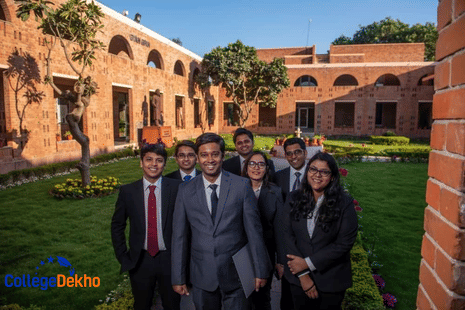
Executive MBA (EMBA) or a traditional MBA is a significant choice, the choice that depends primarily on the career, professional goals, working experience and personal circumstances. The knowledge of the peculiarities of these programs can help professionals determine the variant that suits them most. Read this article to find out which EMBA vs regular MBA which suits you best; compare the key differences between the two programs and make the right choice!
Also Check -
Why Startup Founders Should Consider an Executive MBA
Who Should Choose an Executive MBA Over a Traditional MBA?
The biggest distinction between an EMBA and a traditional MBA is the profile of the students. An Executive MBA targets managers who have considerable experience in management and are already at a leadership level or are on the way to becoming a leader. These professionals intend to develop strategic, leadership and decision-making competencies and continue their full-time jobs. In contrast, the traditional MBA programs are mostly for early- to mid-career and new graduates who want to gain some basic knowledge about business or change their career. The traditional MBA students have a work experience that is normally less than moderate and have an average of 3-5 years.
Executive MBA vs Traditional MBA: What Makes Them Stand Out
Here's a comparison of an EMBA and regular MBA course in terms of curriculum, cost, career prospects and more, which will help you figure out which one's your bets bet!Program Structure and Scheduling
EMBAs offer a flexible, part-time format that predominantly holds classes on weekends, evenings, or in intensive modules, allowing students to balance work and study. This structure is ideal for professionals who cannot afford lengthy career breaks or relocation. Conversely, traditional MBAs are generally full-time, requiring students to commit to daytime classes over one to two years, often entailing relocation or career interruption. Some traditional MBAs also offer part-time or online options, but the on-campus immersion experience is a core aspect of many programs.
Strategic Focus vs. Broad Business Education: Curriculum
Although the two degrees encompass core business-related methodologies such as finance, marketing, operations, and leadership, EMBAs tend to emphasise more on strategic leadership, sophisticated management principles, innovation, and implementation that are applied in the experienced executive. The learning environment takes advantage of the rich interaction between the experienced professionals. Conventional MBAs, in turn, are more likely to provide more generalised curricula that cover foundational courses, internships, and electives in a broad range of different fields, to suit general management or entrepreneurial interests.
EMBA vs Traditional MBA: Career Goals and Outcomes
Although both degrees encompass the fundamental business principles of finance, marketing, operations and leadership, an EMBA may concentrate more on strategic leadership, advanced management principles, innovation and the working level that applies to experienced executives. The learning environment takes advantage of rich peer interactions between experienced professionals. More classic MBAs, though, have more generalised curricula, including the introductory courses, internships, and electives in many fields that satisfy general management goals or are oriented towards entrepreneurship.
Also Check -
Best Executive MBA Programs for Working Professionals
EMBA and Regular MBA: Cost Considerations and Employer Support
EMBA programs are generally more expensive due to their target market’s seniority and program flexibility; however, employer sponsorship and financial support are more common among EMBA students. Traditional MBAs may have varied costs depending on institution and program type, but generally offer greater scholarship availability to younger, early-career candidates. Both programs provide valuable networks and credentials, and ROI depends on aligning the program with individual career aspirations.
Networking and Learning Environment
The networking strength of an EMBA is based on its pool of experienced executives working in and around various industries who contribute real-life experiences and management lessons, which usually result in more robust peer relationships and business relations. Younger, career-oriented traditional MBA cohorts, which often offer more cross-sector exposure, entrepreneurial projects, and internships, offer a more dynamic environment to those who benefit by getting a wider range of experiences.
Also Check -
What to Expect in Executive MBA Coursework?
To conclude, an Executive MBA is the most suitable one when the prospective student is an experienced individual with extensive work experience who does not seek to have a career break but wants to acquire new leadership and strategic business skills. It puts stress on peer training, practice and career development within the current industries or organisations. The traditional MBAs are appropriate for early-career individuals who require full-time study, a shift between careers, or an entrepreneurship-based foundation of full immersion. With proper attention to career goals, working experience, time and financial constraints, the professionals will have the capacity to decide the optimal course of MBA depending on their personal and career wants.
Related Articles
| Essential Skills to Develop Before Starting an Executive MBA | Is an Executive MBA More Valuable Than a Traditional MBA for Career Growth? |
|---|
FAQs
Executive MBA programs are generally costlier but often come with higher employer sponsorship due to their focus on senior leadership development. Traditional MBAs might have more varied scholarship options, but usually require greater personal financial planning for tuition and living expenses.
Executive MBA programs provide networking with seasoned executives and industry leaders, fostering peer learning among senior peers, while traditional MBAs offer networking with younger professionals, often providing broader industry and functional diversity.
EMBA curricula focus on advanced leadership, decision-making, and strategic management tailored to experienced students, while traditional MBA programs offer broader foundational business education with more electives and opportunities for specialisation.
Executive MBA programs are part-time with classes on weekends or evenings to accommodate working professionals, whereas traditional MBAs are generally full-time, requiring students to attend daytime classes and often relocate or pause their careers.
An Executive MBA is designed for experienced professionals with 8-20 years of work experience, typically already in leadership roles, who want to enhance strategic and leadership skills while continuing to work. In contrast, traditional MBAs suit early-to mid-career individuals or recent graduates looking to build foundational business knowledge or switch careers.

















Similar Articles
Steps to Challenge CMAT Answer Key 2026: Check Dates, Fees, Process
TS ICET 2026 Application Form Correction: Dates, Direct Link, Instructions
Documents Required for TS ICET 2026 Application Form: Photo Specifications & Instructions
Delhi School of Business MBA Fees with Placement 2026
CMAT Colleges with Fees & Cutoff 2026: Best ROI MBA Options Revealed
CMAT Response Sheet 2026: PDF Download Link Here